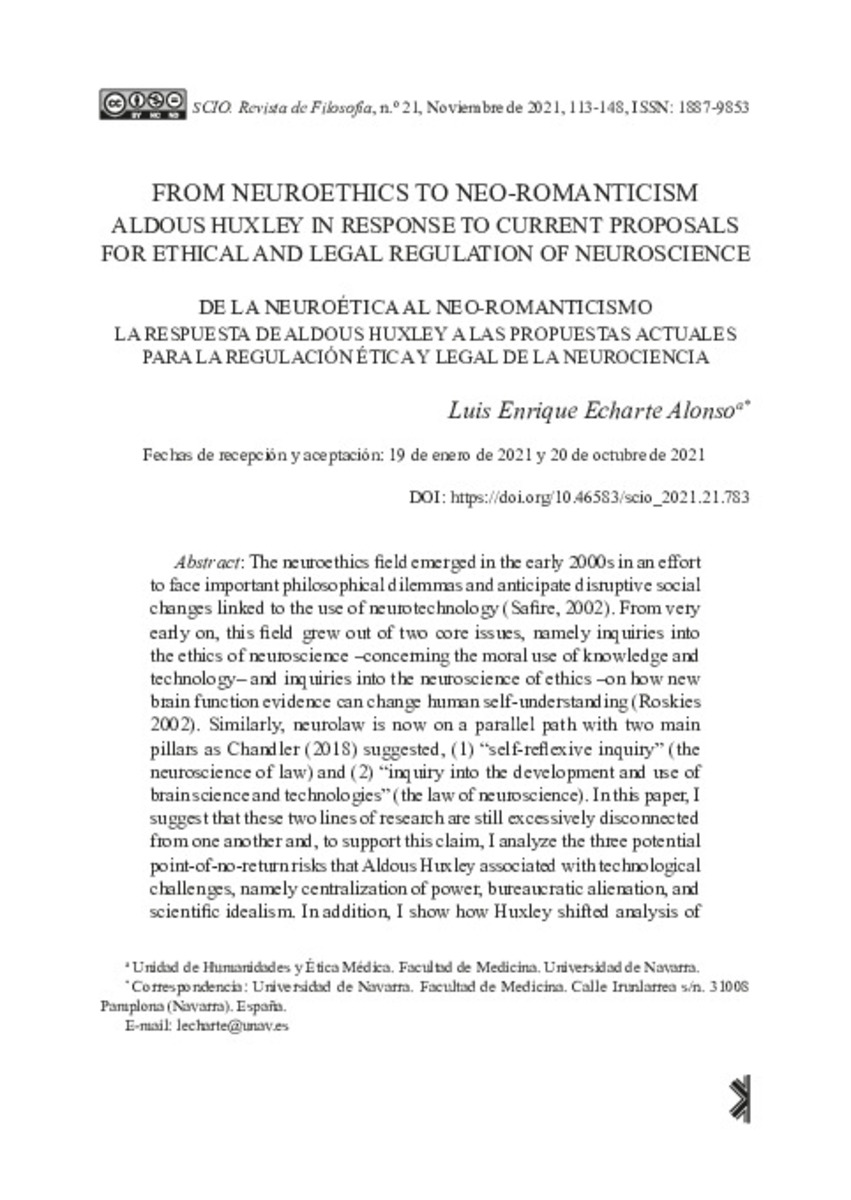Full metadata record
| DC Field | Value | Language |
|---|---|---|
| dc.creator | Echarte-Alonso, L.E. (Luis Enrique) | - |
| dc.date.accessioned | 2022-05-13T15:47:43Z | - |
| dc.date.available | 2022-05-13T15:47:43Z | - |
| dc.date.issued | 2021 | - |
| dc.identifier.citation | Echarte-Alonso, L.E. (Luis Enrique). "From Neuroethics to Neo-romanticism. Aldous Huxley in Response to Current Proposals for Ethical and Legal Regulation of Neuroscience". SCIO. (21), 2021, 113 - 148 | es |
| dc.identifier.issn | 1887-9853 | - |
| dc.identifier.uri | https://hdl.handle.net/10171/63444 | - |
| dc.description.abstract | The neuroethics field emerged in the early 2000s in an effort to face important philosophical dilemmas and anticipate disruptive social changes linked to the use of neurotechnology (Safire, 2002). From very early on, this field grew out of two core issues, namely inquiries into the ethics of neuroscience ¿concerning the moral use of knowledge and technology¿ and inquiries into the neuroscience of ethics ¿on how new brain function evidence can change human self-understanding (Roskies 2002). Similarly, neurolaw is now on a parallel path with two main pillars as Chandler (2018) suggested, (1) ¿self-reflexive inquiry¿ (the neuroscience of law) and (2) ¿inquiry into the development and use of brain science and technologies¿ (the law of neuroscience). In this paper, I suggest that these two lines of research are still excessively disconnected from one another and, to support this claim, I analyze the three potential point-of-no-return risks that Aldous Huxley associated with technological challenges, namely centralization of power, bureaucratic alienation, and scientific idealism. In addition, I show how Huxley shifted analysis of technological problems from a focus on the rights of potential victims to the duties of potential aggressors. Finally, I argue that Aldous Huxley¿s view on how to build a bridge that brings pillars 1) and 2) closer together also helps prevent the technological point-of-no-return. According to Huxley, the key is found in paying particular attention to undeunderstanding contemplative activity, reinforcing its role in the study of reality, and, eventually, returning the romantic gaze updated to academia. | - |
| dc.description.abstract | Resumen: El campo de la neuroética surge a principios de la década de 2000 en un esfuerzo por enfrentar dilemas filosóficos relevantes y anticipar cambios sociales disruptivos vinculados al uso de la neurotec- nología (Safire, 2002). Desde muy pronto, este campo fue constituido en torno a dos cuestiones centrales, a saber, las investigaciones sobre la ética de la neurociencia –en relación con el uso moral del conocimiento y la tecnología– y las investigaciones sobre la neurociencia de la ética –sobre cómo la nueva evidencia de la función cerebral puede cambiar la autocomprensión humana (Roskies 2002)–. De manera similar, el campo del neuroderecho se encuentra ahora en un camino paralelo y, como señala Chandler (2018), se asienta en dos pilares principales: (1) “la indagación autorreflexiva” (la neurociencia del derecho) y (2) “la indagación sobre el desarrollo y uso del cerebro ciencia y tecnologías” (la ley de la neurociencia). En este artículo, sugiero que estas dos líneas de investigación todavía están excesivamente desconectadas entre sí y, para respaldar esta afirmación, analizo los tres riesgos potenciales de punto de no retorno que Aldous Huxley asocia a los desafíos tecnológicos, a saber, la centralización de poder, la alienación burocrática y el idealismo científico. Además, muestro cómo Huxley cambia el enfoque habitual: traslada el análisis de los derechos de las potenciales víctimas al análisis de los deberes de los potenciales agresores. Finalmente, sostengo que la visión de Aldous Huxley sobre cómo construir un puente que acerque los pilares 1) y 2) también ayudaría a prevenir el punto de no retorno tecnológico. Según Huxley, la clave está en comprender mejor la acti- vidad contemplativa, en reforzar su papel en el estudio de la realidad y, finalmente, en devolver una renovada visión romántica a la academia. | - |
| dc.language.iso | en | - |
| dc.rights | info:eu-repo/semantics/openAccess | - |
| dc.subject | Neurolaw | - |
| dc.subject | Aldous Huxley | - |
| dc.subject | Neurotechnology | - |
| dc.subject | Centralization of power | - |
| dc.subject | Bureaucracy | - |
| dc.subject | Scientific idealism | - |
| dc.subject | Contemplation | - |
| dc.subject | Romanticism | - |
| dc.subject | Neuroderecho | - |
| dc.subject | Neurotecnología | - |
| dc.subject | Centralización del poder | - |
| dc.subject | Burocracia | - |
| dc.subject | Idealismo científico | - |
| dc.subject | Contemplación | - |
| dc.subject | Romanticismo | - |
| dc.title | From Neuroethics to Neo-romanticism. Aldous Huxley in Response to Current Proposals for Ethical and Legal Regulation of Neuroscience | - |
| dc.title.alternative | De la Neuroética al Neo-Romanticismo. La respuesta de Aldous Huxley a las propuestas actuales para la regulación ética y legal de la Neurociencia | - |
| dc.type | info:eu-repo/semantics/article | - |
| dc.description.note | CC BY NC ND | - |
| dc.identifier.doi | 10.46583/scio_2021.21.783 | - |
| dadun.citation.endingPage | 148 | - |
| dadun.citation.number | 21 | - |
| dadun.citation.publicationName | SCIO | - |
| dadun.citation.startingPage | 113 | - |
Files in This Item:
Statistics and impact
Items in Dadun are protected by copyright, with all rights reserved, unless otherwise indicated.






